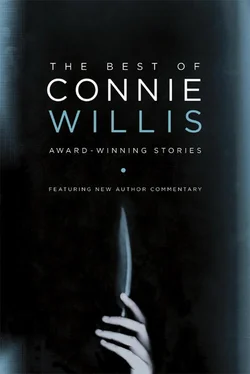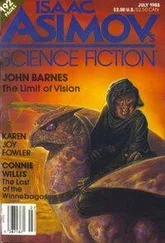“What happened to the people on the ship?” Neil says again.
“They got judged,” I say, “but it wasn’t nearly as bad as they’d thought. They were all afraid of what was going to happen, even the clergyman, who hadn’t committed any sins, but the judge turned out to be somebody he knew. A bishop. He wore a white suit, and he was very kind, and most of them came out fine.”
“Most of them,” Neil says.
“Let’s go ,” Lissa says, pulling on his arm.
“The people on the ship,” Neil says, ignoring her. “Had any of them committed some horrible sin?”
“My ankle hurts,” Lissa says. “Come on .”
“I have to go,” Neil says, almost reluctantly. “Why don’t you come with us?”
I glance at Lissa, expecting her to be looking daggers at Neil, but she is watching me with bright, lidless eyes.
“Yes. Come with us,” she says, and waits for my answer.
I lied to Lissa about the ending of Death on the Nile . It was the wife they killed. I toy with the idea that they have committed some horrible sin, that I am lying in my hotel room in Athens, my temple black with blood and powder burns. I would be the only one here, then, and Lissa and Neil would be demigods disguised to look like them. Or monsters.
“I’d better not,” I say, and back away from them.
“Let’s go, then,” Lissa says to Neil, and they start off across the sand. Lissa is limping badly, and before they have gone very far, Neil stops and takes off his shoes.
The sky behind the Pyramids is purple-blue, and the Pyramids stand out flat and black against it.
“Come on,” Zoe calls from the top of the steps. She is holding the flashlight and looking at the guidebook. “I want to see the weighing of the soul.”
Chapter 7: Off the Beaten Track
Zoe is already halfway down the steps when I get back, shining her flashlight on the door below her. “When the tomb was discovered, the door was plastered over and stamped with the seals bearing the cartouche of Tutankhamun,” she says.
“It’ll be dark soon,” I call down to her. “Maybe we should go back to the hotel with Lissa and Neil.” I look back across the desert, but they are already out of sight.
Zoe is gone, too. When I look back down the steps, there is nothing but darkness. “Zoe!” I shout and run down the sand-drifted steps after her. “Wait!”
The door to the tomb is open, and I can see the light from her flashlight bobbing on rock walls and ceiling far down a narrow corridor.
“Zoe!” I shout, and start after her. The floor is uneven, and I trip and put my hand on the wall to steady myself. “Come back! You have the book!”
The light flashes on a section of carved-out wall, far ahead, and then vanishes, as if she has turned a corner.
“Wait for me!” I shout and stop because I cannot see my hand in front of my face.
There is no answering light, no answering voice, no sound at all. I stand very still, one hand still on the wall, listening for footsteps, for quiet padding, for the sound of slithering, but I can’t hear anything, not even my own heart beating.
“Zoe,” I call out, “I’m going to wait for you outside,” and turn around, holding on to the wall so I don’t get disoriented in the dark, and go back the way I came.
The corridor seems longer than it did coming in, and I toy with the idea that it will go on forever in the dark, or that the door will be locked, the opening plastered over and the ancient seals affixed, but there is a line of light under the door, and it opens easily when I push on it.
I am at the top of a stone staircase leading down into a long wide hall. On either side the hall is lined with stone pillars, and between the pillars I can see that the walls are painted with scenes in sienna and yellow and bright blue.
It must be the anteroom because Zoe said its walls were painted with scenes from the soul’s journey into death, and there is Anubis weighing the soul, and, beyond it, a baboon devouring something, and, opposite where I am standing on the stairs, a painting of a boat crossing the blue Nile. It is made of gold, and in it four souls squat in a line, their kohl-outlined eyes looking ahead at the shore. Beside them, in the transparent water, Sebek, the crocodile demigod, swims.
I start down the steps. There is a doorway at the far end of the hall, and if this is the anteroom, then the door must lead to the burial chamber.
Zoe said the tomb consists of only three rooms, and I saw the map myself on the plane, the steps and straight corridor and then the unimpressive rooms leading one into another, anteroom and burial chamber and Hall of Judgment, one after another.
So this is the anteroom, even if it is larger than it was on the map, and Zoe has obviously gone ahead to the burial chamber and is standing by Tutankhamun’s coffin, reading aloud from the travel guide. When I come in, she will look up and say, “The quartzite sarcophagus is carved with passages from The Book of the Dead .”
I have come halfway down the stairs, and from here I can see the painting of the weighing of the soul. Anubis, with his jackal’s head, standing on one side of the yellow scales, and the deceased on the other, reading his confession from a papyrus.
I go down two more steps, till I am even with the scales, and sit down.
Surely Zoe won’t be long—there’s nothing in the burial chamber except the coffin—and even if she has gone on ahead to the Hall of Judgment, she’ll have to come back this way. There’s only one entrance to the tomb. And she can’t get turned around because she has a flashlight. And the book. I clasp my hands around my knees and wait.
I think about the people on the ship, waiting for judgment. “It wasn’t as bad as they thought,” I told Neil, but now, sitting here on the steps, I remember that the bishop, smiling kindly in his white suit, gave them sentences appropriate to their sins. One of the women was sentenced to being alone forever.
The deceased in the painting looks frightened, standing by the scale, and I wonder what sentence Anubis will give him, what sins he has committed.
Maybe he has not committed any sins at all, like the clergyman, and is worried over nothing, or maybe he is merely frightened at finding himself in this strange place, alone. Was death what he expected?
“Death is the same everywhere,” Zoe’s husband said. “Unexpected.” And nothing is the way you thought it would be. Look at the Mona Lisa . And Neil. The people on the ship had planned on something else altogether, pearly gates and angels and clouds, all the modern refinements. Prepare to be disappointed.
And what about the Egyptians, packing their clothes and wine and sandals for their trip? Was death, even on the Nile, what they expected? Or was it not the way it had been described in the travel guide at all? Did they keep thinking they were alive, in spite of all the clues?
The deceased clutches his papyrus and I wonder if he has committed some horrible sin. Adultery. Or murder. I wonder how he died.
The people on the ship were killed by a bomb, like we were. I try to remember the moment it went off—Zoe reading out loud and then the sudden shock of light and decompression, the travel guide blown out of Zoe’s hands and Lissa falling through the blue air, but I can’t. Maybe it didn’t happen on the plane. Maybe the terrorists blew us up in the airport in Athens, while we were checking our luggage.
I toy with the idea that it wasn’t a bomb at all, that I murdered Lissa and then killed myself, like in Death on the Nile . Maybe I reached into my bag, not for my paperback but for the gun I bought in Athens, and shot Lissa while she was looking out the window. And Neil bent over her, solicitous, concerned, and I raised the gun again, and Zoe’s husband tried to wrestle it out of my hand, and the shot went wide and hit the gas tank on the wing.
Читать дальше












